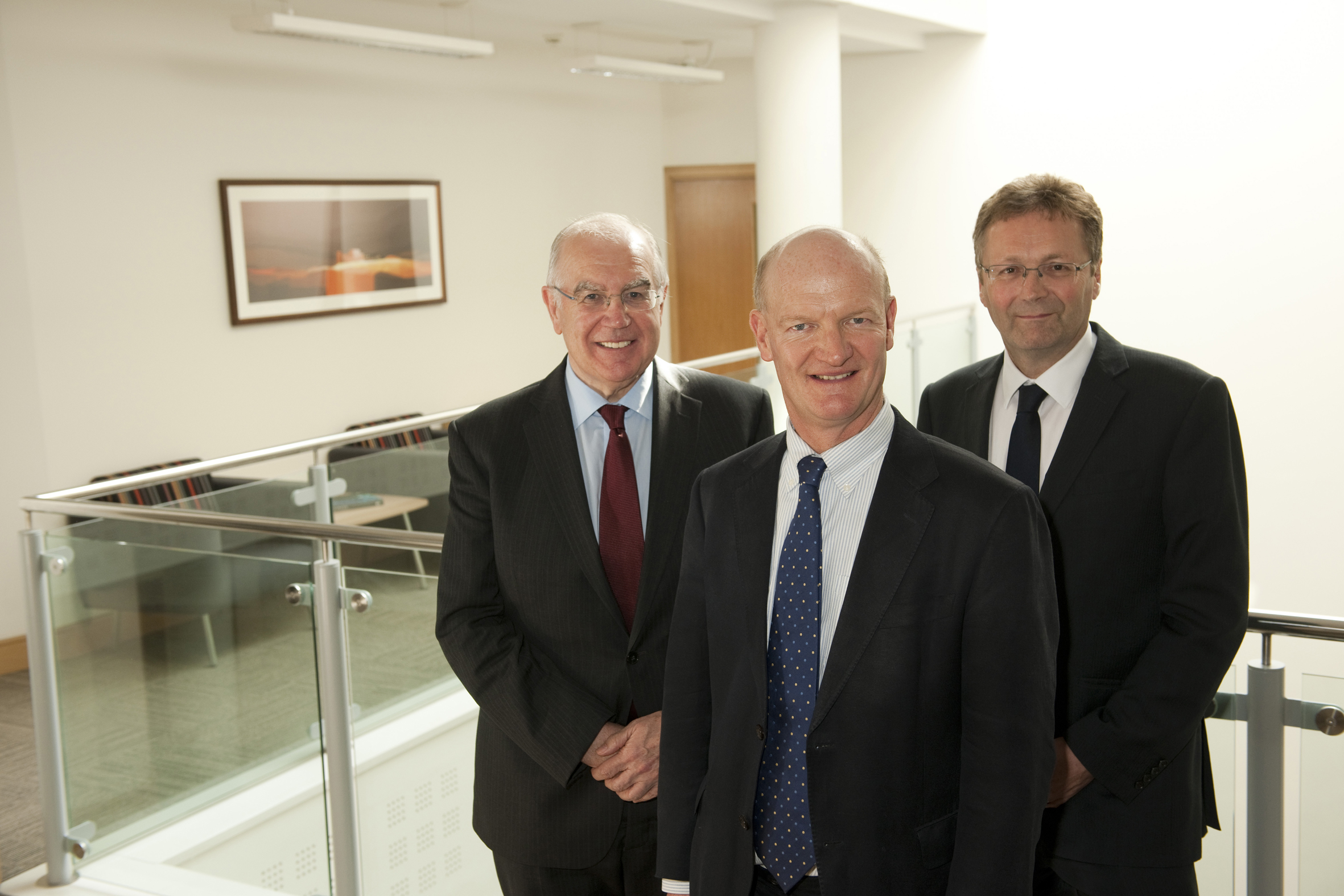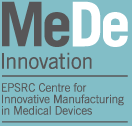Minister learns about collaboration between academia and industry

September 27, 2013
Innovative partnerships between the University of Leeds and key medical technologies companies were highlighted at ministerial level.
New Vice-Chancellor Sir Alan Langlands hosted a round table discussion about the Government’s strategy for life sciences across the UK, as part of a visit by Minister for Universities and Science, the Rt Hon David Willetts MP.
They were joined by key business leaders and representatives from the region’s medical technologies sector, as well as Deputy Vice-Chancellor and MeDe Innovation Director Professor John Fisher CBE, a world leading researcher in medical engineering, who chaired the discussion.
In late 2011, Prime Minister David Cameron unveiled a ten-year Strategy for UK Life Sciences to support collaboration between academia and industry, improve the business environment for the sector and ensure sufficient numbers of appropriately skilled employees.
Reviewing the strategy’s progress a year on, Mr Cameron described the life science industry as “truly a jewel in the crown of our economy”, citing the UK’s 380 pharmaceutical companies employing almost 70,000 people with an annual turnover of £30 billion. The medical technologies and medical biotechnology sectors employ a further 96,000, with a combined turnover of £20 billion.
Mr Willetts said: “Leeds is a vibrant location for the medical technologies industry and the University is playing a vital role in supporting and developing the life sciences sector.
They were joined by key business leaders and representatives from the region’s medical technologies sector, as well as Deputy Vice-Chancellor and MeDe Innovation Director Professor John Fisher CBE, a world leading researcher in medical engineering, who chaired the discussion.
In late 2011, Prime Minister David Cameron unveiled a ten-year Strategy for UK Life Sciences to support collaboration between academia and industry, improve the business environment for the sector and ensure sufficient numbers of appropriately skilled employees.
Reviewing the strategy’s progress a year on, Mr Cameron described the life science industry as “truly a jewel in the crown of our economy”, citing the UK’s 380 pharmaceutical companies employing almost 70,000 people with an annual turnover of £30 billion. The medical technologies and medical biotechnology sectors employ a further 96,000, with a combined turnover of £20 billion.
Mr Willetts said: “Leeds is a vibrant location for the medical technologies industry and the University is playing a vital role in supporting and developing the life sciences sector.
“I’ve seen remarkable examples of innovative solutions to complex medical problems today which are not only helping to benefit people’s health and improve their quality of life, but also keeping the UK at the front of the global technology race.”
Following the round table discussion at the University, Sir Alan Langlands, who formally takes up his post as Vice-Chancellor next Tuesday, said:
Following the round table discussion at the University, Sir Alan Langlands, who formally takes up his post as Vice-Chancellor next Tuesday, said:
“It has been a pleasure to welcome the Minister for Universities and Science to the University to discuss opportunities to grow innovation and enterprise in the medical technologies sector – a key aspect of the UK life sciences base.
“Unlocking some of these opportunities will be key to the future competitiveness of the UK.”
“Unlocking some of these opportunities will be key to the future competitiveness of the UK.”
Dr Ceri Williams, Director of Operations at the University of Leeds’ Medical Technologies Innovation and Knowledge Centre, added:
“The University of Leeds has world-leading capabilities and facilities, as well as the innovation infrastructure to help medical technologies companies access knowledge and intellectual property for the development of new products to grow this important sector in the UK.”
The round table discussions at the University of Leeds touched on how the UK can improve its global competitiveness in the medical technologies sector – specifically equipping graduates and post graduates with the right mix of skills; providing the best environment to support innovation and wealth creation, and strengthening collaboration between academia, industry and the NHS.
“The University of Leeds has world-leading capabilities and facilities, as well as the innovation infrastructure to help medical technologies companies access knowledge and intellectual property for the development of new products to grow this important sector in the UK.”
The round table discussions at the University of Leeds touched on how the UK can improve its global competitiveness in the medical technologies sector – specifically equipping graduates and post graduates with the right mix of skills; providing the best environment to support innovation and wealth creation, and strengthening collaboration between academia, industry and the NHS.
As part of Mr Willetts’ visit to the Leeds region, he saw for himself the progress being made to further these aims, confirming £4.35m of Regional Growth Fund investment at DePuy Synthes’ Beeston facility. The orthopaedic equipment specialist has had a successful strategic technology partnership with the University since 2000.
Mr Willetts said: “The significant regional growth funding awarded to DePuy Synthes will help to create 20 new jobs and keep over 450 in Beeston, supporting growth in the local economy and reflecting the Government’s commitment to life sciences as part of the Industrial Strategy.”
The Minister also paid a visit to Brandon Medical, an award-winning medical equipment specialists based in Morley.
Other participants in the round table discussion were:
Mr Willetts said: “The significant regional growth funding awarded to DePuy Synthes will help to create 20 new jobs and keep over 450 in Beeston, supporting growth in the local economy and reflecting the Government’s commitment to life sciences as part of the Industrial Strategy.”
The Minister also paid a visit to Brandon Medical, an award-winning medical equipment specialists based in Morley.
Other participants in the round table discussion were:
• Dr Michael Barker, Worldwide Vice President for Research and Development at DePuy Synthes Joint Reconstruction.
• Graham Bowland, CEO, Surgical Innovations Group plc
• Peter Ellingworth, Chief Executive, Association of British Healthcare Industries
• Graeme Hall, MD, Brandon Medical
• Dr Roland Henney, Operations Director, Xiros
• Frank Hester, CEO, TPP
• Professor Graham Isaac, Distinguished Engineering Fellow – Hips, De Puy Synthes Joint Reconstruction R&D
• Dr Tim Morley, Senior Director Preclinical Research, Smith & Nephew
• Dr Gary Sheard, CEO, RSL Steeper

- July 2019
- February 2019
- December 2018
- November 2018
- October 2018
- August 2018
- July 2018
- June 2018
- May 2018
- April 2018
- March 2018
- February 2018
- January 2018
- December 2017
- November 2017
- October 2017
- September 2017
- August 2017
- June 2017
- May 2017
- March 2017
- February 2017
- January 2017
- November 2016
- October 2016
- September 2016
- July 2016
- June 2016
- May 2016
- April 2016
- March 2016
- February 2016
- January 2016
- December 2015
- November 2015
- September 2015
- July 2015
- June 2015
- May 2015
- April 2015
- March 2015
- February 2015
- January 2015
- December 2014
- November 2014
- October 2014
- September 2014
- August 2014
- July 2014
- June 2014
- April 2014
- March 2014
- February 2014
- January 2014
- December 2013
- October 2013
- September 2013
- February 2013
